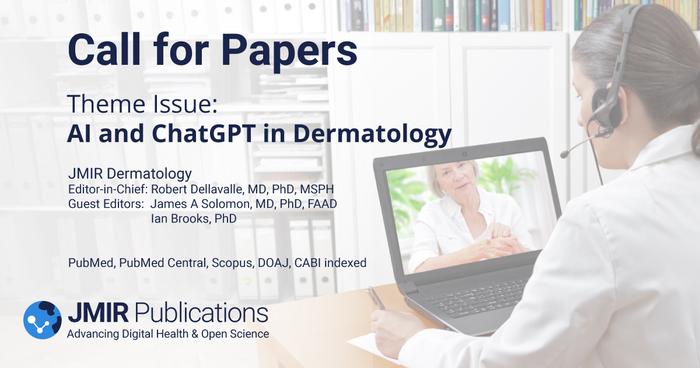JMIR Dermatology Editor-in-Chief: Robert Dellavalle, MD, PhD, MSPH and guest editors James A Solomon, MD, PhD, FAAD and Ian Brooks, PhD welcome submissions to a special theme issue examining “Artificial Intelligence (AI) and ChatGPT in Dermatology.”

Credit: JMIR Publications
JMIR Dermatology Editor-in-Chief: Robert Dellavalle, MD, PhD, MSPH and guest editors James A Solomon, MD, PhD, FAAD and Ian Brooks, PhD welcome submissions to a special theme issue examining “Artificial Intelligence (AI) and ChatGPT in Dermatology.”
JMIR Dermatology welcomes all topics related to diseases of the skin, hair, and nails, with a wide breadth and depth of papers focusing on AI applications. All topics at the intersection of dermatology, AI, and ChatGPT are eligible for this theme issue.
The journal places a special emphasis on exchanging clinical information, providing education, facilitating diagnosis and care, and promoting dermatological health globally.
Dermatologists can use ChatGPT in clinical practice and research in several ways, including:
- Virtual consultations: ChatGPT can be used to provide virtual consultations to patients who cannot visit a dermatologist in person. Dermatologists can program ChatGPT to ask relevant questions about the patient’s skin condition, medical history, and symptoms. Based on the patient’s responses, ChatGPT can provide recommendations or refer the patient to a dermatologist for further evaluation.
- Patient recruitment: ChatGPT can be used to identify and recruit patients for clinical trials or research studies. ChatGPT can engage with potential study participants and collect preliminary information about their eligibility and interest in participating in the study.
- Literature review: ChatGPT can be used to conduct literature reviews related to dermatology. It can be programmed to search for and analyze relevant articles and summarize the key findings.
- Education: Dermatologists can use ChatGPT to educate patients about skin conditions, treatments, and prevention. They can program ChatGPT to provide information about specific skin conditions, recommended treatments, and preventive measures.
- Research: ChatGPT can be trained to recognize patterns in the data and provide insights that may not be immediately apparent to the researchers. Natural language processing (NLP) can be used to analyze large amounts of textual data related to dermatology, such as electronic medical records, patient feedback, or social media posts. ChatGPT can be trained to recognize patterns in the data and provide insights into patient experiences, treatment outcomes, and disease prevalence.
- Patient follow-up: Dermatologists can use ChatGPT to follow up with patients after a consultation or treatment. ChatGPT can ask patients about their progress and any side effects or new symptoms. Based on the patient’s responses, ChatGPT can provide recommendations or refer the patient to a dermatologist for further evaluation.
JMIR Dermatology welcomes submissions from researchers and practitioners in dermatology, medicine, health care, computer science, and related fields.
The deadline for submissions is December 31, 2023. All accepted manuscripts will be published as part of the JMIR Dermatology special theme issue on AI and ChatGPT in Dermatology.
To learn more please visit: https://derma.jmir.org/announcements/404
###
About JMIR Publications
JMIR Publications is a leading, born-digital, open access publisher of 30+ academic journals and other innovative scientific communication products that focus on the intersection of health and technology. Its flagship journal, the Journal of Medical Internet Research, is the leading digital health journal globally in content breadth and visibility, and it is the largest journal in the medical informatics field.
To learn more about JMIR Publications, please visit https://www.JMIRPublications.com or connect with us via Twitter, LinkedIn, YouTube, Facebook, and Instagram.
Head office: 130 Queens Quay East, Unit 1100, Toronto, ON, M5A 0P6 Canada
Media contact: [email protected]




